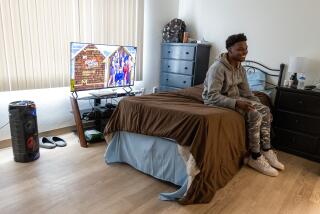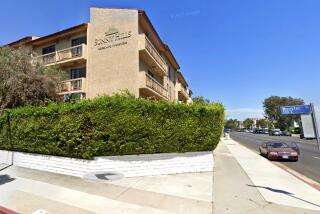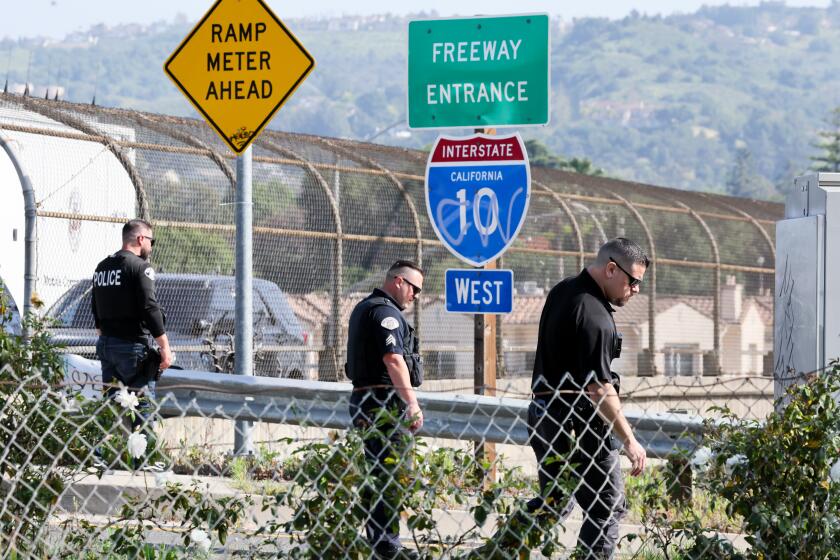Agency helps Asian American families open their homes to foster children in Southern California
When Elaine Chang decided to become a foster parent, she knew she wanted the child to be Korean.
She and her husband were born in South Korea, speak Korean and belong to a Korean church, so fostering a Korean child would help ease the transition into a new home, she reasoned.
Nearly four years ago, the couple — who lived in Irvine at the time — took in an 8-day-old Korean American baby boy. A year and a half later, they adopted him.
“I wanted to provide as much as I could,” Chang said. “He might not know who his biological parents are, but he’ll know what his roots are.”
Stories like Chang’s are rare in Southern California, where few Asian families are licensed foster parents to support the estimated 1,000 Asian foster children in Los Angeles and Orange counties. Many of these children grew up speaking Korean, Mandarin or Vietnamese and need families that also speak the same language.
To address this growing need, the Asian Foster Family Initiative — the country’s first and only foster family agency specifically for Asians and Pacific Islanders — has been recruiting Asian Americans in Southern California to become foster parents. This fall, the organization secured a contract with the Orange County Social Services Agency, making it easier for the county to match Asian foster parents and Asian foster children.
“Our community needs to be out there and do more for our own children,” said Connie Chung Joe, executive director of Korean American Family Services, which launched the Asian Foster Family Initiative. “It’s hard enough, the trauma of being separated from your family and being put into a stranger’s home. But when no one knows your food, your culture or even your language, that can be extra traumatic for kids.”
Chung Joe said she began working on the issue five years ago, when her own research showed that there was not a single Korean foster parent in Los Angeles County, which was causing significant problems for the estimated 100 Korean foster children in the area.
“The kids sometimes didn’t speak English or weren’t used to the food or customs, so the kids were saying they were in distress,” she said. “We were hearing stories about kids who would stop bathing, they were having nightmares, and they weren’t eating well.”
So Chung Joe set out to eliminate the barriers many Asians face to become foster parents.
For instance, licensing requires up to 20 hours of training, first aid and CPR certification, which was available only in English at the time, Chung Joe said. So the Asian Foster Family Initiative started holding the training sessions in clients’ languages and offered clinics to guide families through the lengthy written application.
“It’s hard enough even if you speak English and know the system well to go through all of that,” she said. “But if you don’t speak English perfectly fluently, and you don’t know, culturally, how to navigate the system, it’s really hard to get through the process.”
The Asian Foster Family Initiative also launched a public awareness campaign in the Asian community. This included explaining what fostering is — since many Asian countries don’t have a foster system — and dispelling misconceptions. One point the agency drove home was that foster parents don’t have to be U.S. citizens. It also reached out to churches and other community groups to encourage families to foster.
“Koreans have the highest rate of missionaries of any other culture in the world,” Chung Joe said. “We go around the world trying to help children in need, yet in our own backyard, there might be a Korean American child and we’re not doing anything for that child. I think a lot of people felt like, `We need to take care of our own children.’”
This is the message that Chang said moved her to become a foster parent.
“It’s bad enough to be away from their parents, but the different culture, it’s not easy for them to adjust,” she said. “That moved my heart and I felt like, ‘Maybe I can do this.’”
Laura Turtzer, a spokeswoman for the Orange County Social Services Agency, which contracted the Asian Foster Family Initiative as a foster family agency, said the county has also reached out to the Asian American community by participating in Tet festivals and Asian night markets to encourage more Asian American foster parents.
The county also helps foster families understand the needs of Asian American foster children. In training sessions, prospective resource families learn that a child’s ethnicity and culture are a part of his or her identity, and they are encouraged to create opportunities for themselves and their foster child to learn about and integrate cultural traditions, Turtzer said in an email.
Turtzer said the Asian Foster Family Initiative will build on this work by providing more families who can serve the cultural and linguistic needs of children in the county.
Chung Joe said her organization has trained 49 new foster families so far. The Asian Foster Family Initiative currently works in the Korean, Chinese and Filipino communities and is expanding its Orange County services to include Vietnamese.
Chang, a nurse who also has two biological children, said that while there was once stigma in the Asian American community around fostering and adopting children, the culture has shifted toward greater awareness and acceptance.
“If you start looking for differences between you and your son, you’ll see so many differences,” she said. “But if you look for the things that are like you, they’ll be there.
“It’s the same thing with biological kids.”
Caitlin Yoshiko Kandil is a contributor to Times Community News.
More to Read
Start your day right
Sign up for Essential California for news, features and recommendations from the L.A. Times and beyond in your inbox six days a week.
You may occasionally receive promotional content from the Los Angeles Times.






